American Science Fiction: Nine Classic Novels of the 1950s from the Library of America
As the year of the Grand Master Reading Challenge at Worlds Without End winds down, some of you may, like me, be scrambling to complete it. It seems timely, then, that the Library of America has just released the two-volume American Science Fiction: Nine Classic Novels of the 1950s, which contains four Grand Master novels, along with five that probably should be (how can Theodore Sturgeon not be a Grand Master?).
Four Classic Novels 1953-1956
Frederik Pohl and C. M. Kornbluth, The Space Merchants
Theodore Sturgeon, More Than Human
Leigh Brackett, The Long Tomorrow
Richard Matheson, The Shrinking Man
Five Classic Novels 1956-58
Robert A. Heinlein, Double Star
Alfred Bester, The Stars My Destination
James Blish, A Case of Conscience
Algis Budrys, Who?
Fritz Leiber, The Big Time
More information on the books, including introductions to each by current writers such as Neil Gaiman, William Gibson, and Connie Willis, along with a timeline of 1950s SF, a gallery of cover art, contemporary radio and TV adaptations, and essays by editor Gary K. Wolfe, Robert Silverberg, and Barry Malzberg, can be found at a website created by the Library of American to accompany the set. (Consistent with the Library’s policy from its inception, the books themselves contain the novels’ texts, without introduction or commentary.)
Professor Wolfe, best-known in the SF community for his long tenure as a reviewer for Locus Magazine, and as one-half of the team that produces the always interesting Coode Street Podcast every week, is the editor of the volumes, and has discussed how he approached selecting the novels in the podcast and in an interview at the Library of America blog. He does not claim that these nine novels are necessarily the best science fiction of the 1950s, but rather that they are all classics deserving of continued attention, and are a good representative sampling of the best of the decade during which SF first came into its own as a medium for the novel. (Prior to the ‘50s, very few SF novels were published, though some were serialized in the magazines, and any anthology of classic science fiction from earlier decades would necessarily have to be a collection of mostly short fiction.) He was constrained by the desire of the publisher, in the interest of variety, to include fairly short novels, all by different writers. Most novels published during the decade were short by modern standards, so the length constraint wouldn’t have been overly limiting, but classics like Walter M. Miller’s A Canticle for Leibowitz and Bernard Wolfe’s Limbo were too long to be included. Two of the all-time best SF novels were written by Alfred Bester during the ‘50s, but Wolfe had to choose between The Demolished Man and The Stars My Destination. He also left out books like Isaac Asimov’s Foundation and Ray Bradbury’s The Martian Chronicles which, though often marketed as novels, are really collections of linked stories that originally appeared separately in the SF magazines.
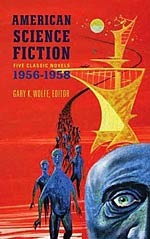
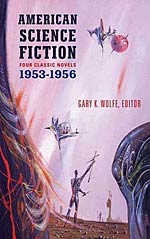 Of course, quibbling with the selections is part of the fun with a set like this. Paul di Filippo, in his comprehensive review of the books, writes that he would reluctantly remove Double Star and replace it with either City or Ring Around the Sun, by Grand Master Clifford Simak, whose “Norman Rockwell meets Forbidden Planet vibe is unduplicated, and a vital part of the era’s appeal.” Having recently read Ring Around the Sun, and not being much of a Heinlein fan, I would tend to agree, but can a set of classic ‘50s SF really leave out Heinlein? I would also have liked to have seen Asimov’s The End of Eternity included, but I don’t know which of Wolfe’s picks I’d take out in order to make room for it. I’m sure other readers familiar with the period have their own favorites, but I doubt if many would argue too much with his picks. Another obvious omission when considering the most important science fiction novels of the ‘50s is Arthur C. Clarke’s Childhood’s End, still considered one of the greatest SF novels of all time. This classic, however, isn’t here because Clarke is not American, which brings me to the importance of the Library of America, its mission, and its production values, all of which help explain why I was so excited to hear that the American Science Fiction volumes were being released.
Of course, quibbling with the selections is part of the fun with a set like this. Paul di Filippo, in his comprehensive review of the books, writes that he would reluctantly remove Double Star and replace it with either City or Ring Around the Sun, by Grand Master Clifford Simak, whose “Norman Rockwell meets Forbidden Planet vibe is unduplicated, and a vital part of the era’s appeal.” Having recently read Ring Around the Sun, and not being much of a Heinlein fan, I would tend to agree, but can a set of classic ‘50s SF really leave out Heinlein? I would also have liked to have seen Asimov’s The End of Eternity included, but I don’t know which of Wolfe’s picks I’d take out in order to make room for it. I’m sure other readers familiar with the period have their own favorites, but I doubt if many would argue too much with his picks. Another obvious omission when considering the most important science fiction novels of the ‘50s is Arthur C. Clarke’s Childhood’s End, still considered one of the greatest SF novels of all time. This classic, however, isn’t here because Clarke is not American, which brings me to the importance of the Library of America, its mission, and its production values, all of which help explain why I was so excited to hear that the American Science Fiction volumes were being released.
The Library is a non-profit publisher that began issuing uniform editions of important American writers in 1982, with the goal of keeping them permanently in print. Over two-hundred volumes have been published so far. The books themselves are simply and beautifully designed, each containing anywhere from 700 to well over 1000 pages, yet they are compact, light, and durable. The paper is acid-free and resistant to wear, the cloth used for the covers is colorfast and dirt-resistant, and the binding is sewn, so the spine lies open nicely without ever breaking, despite the large number of pages in each volume. The texts themselves are thoroughly researched and authoritative, presenting the best and most complete versions possible, along with endnotes including textual variants and explanations of period references. I’ve been collecting these volumes from the early days of the series, and the books I bought and read thirty years ago still look as new as the American Science Fiction set that arrived a month ago. The list price for the two-volume slipcased edition is seventy dollars, which is typical for the Library, but can be had from online retailers for around forty-five. Five dollars per novel doesn’t seem much to pay for such high-quality books, especially considering that nine paperbacks or e-books would likely be more expensive. Along with having access to a great collection of American literature and wishing to support the Library’s non-profit mission, another reason I’ve never stopped collecting these books over the years is that they strike me as an excellent value.
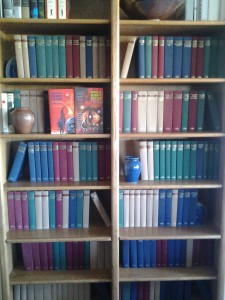 Finally, science fiction fans’ reasons to welcome this release go beyond the availability of the books themselves. American literature does not have an official canon, but the Library of America is the closest thing to it. Careful consideration is given by the Library’s Board of Directors to the decision of which authors are included in the series. During the ’80s, they stuck to uncontroversial selections of nineteenth century writers like Melville, Twain, and James, entering the twentieth century beginning around 1990 with William Faulkner and Richard Wright. The first writer in the series to come from the world of genre fiction was Raymond Chandler in 1995, eighty volumes into the series, followed in 1997 by the two-volume Crime Novels: American Noir set—a selection of novels by various authors from the ‘30s through the ‘50s, and the model format of the new SF set.
Finally, science fiction fans’ reasons to welcome this release go beyond the availability of the books themselves. American literature does not have an official canon, but the Library of America is the closest thing to it. Careful consideration is given by the Library’s Board of Directors to the decision of which authors are included in the series. During the ’80s, they stuck to uncontroversial selections of nineteenth century writers like Melville, Twain, and James, entering the twentieth century beginning around 1990 with William Faulkner and Richard Wright. The first writer in the series to come from the world of genre fiction was Raymond Chandler in 1995, eighty volumes into the series, followed in 1997 by the two-volume Crime Novels: American Noir set—a selection of novels by various authors from the ‘30s through the ‘50s, and the model format of the new SF set.
Despite these forays into the crime fiction genre, the decision to jump into the world of twentieth century fantastic fiction with the publication of an H. P. Lovecraft collection in 2005 came as something of a surprise to followers of the publisher, and paved the way for the three Philip K. Dick volumes that arrived from 2007 to 2009. Since then, we’ve gotten two volumes by Kurt Vonnegut, a comprehensive Shirley Jackson volume, and the two-volume Peter Straub-edited anthology of terror and the uncanny, American Fantastic Tales. With the arrival of the new science fiction volumes, the speculation has begun about what might come next. A Ray Bradbury collection? A set of 1960s novels? My own hope would be for a science fiction short story collection modeled on American Fantastic Tales.
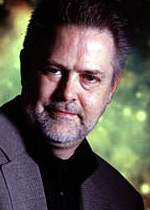 Of course, science fiction fans don’t need the imprimatur of the Library of America to verify the respectability of this type of literature, but, as someone who has been reading the Library from the beginning, and who would have been shocked to learn back when it began that Philip K. Dick would end up on that bookshelf, I have to admit to a certain satisfaction that arises from seeing these books next to Hawthorne, Thoreau, and Lincoln on my bookcase. Theodore Sturgeon, Robert Heinlein, and the other authors represented in this series will now remain in print permanently within a series of books that will likely be referred to long into the future as representing what is essential in American literature. The importance of these books is not so much what their existence says to SF fans, but what it says to the literary audience that respects the decisions of the Library of America. And for those SF readers who aren’t very familiar with the novels from the era represented in these books, you now have an excellent place to start in exploring the decade when science fiction reached what many still consider to be its Golden Age.
Of course, science fiction fans don’t need the imprimatur of the Library of America to verify the respectability of this type of literature, but, as someone who has been reading the Library from the beginning, and who would have been shocked to learn back when it began that Philip K. Dick would end up on that bookshelf, I have to admit to a certain satisfaction that arises from seeing these books next to Hawthorne, Thoreau, and Lincoln on my bookcase. Theodore Sturgeon, Robert Heinlein, and the other authors represented in this series will now remain in print permanently within a series of books that will likely be referred to long into the future as representing what is essential in American literature. The importance of these books is not so much what their existence says to SF fans, but what it says to the literary audience that respects the decisions of the Library of America. And for those SF readers who aren’t very familiar with the novels from the era represented in these books, you now have an excellent place to start in exploring the decade when science fiction reached what many still consider to be its Golden Age.



















 Full Details
Full Details
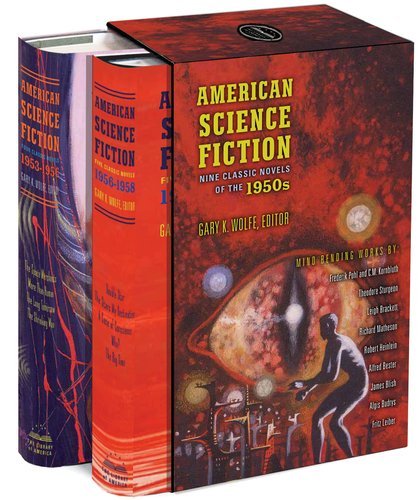


5 Comments
I have been looking longingly at this set. I had set out to read early classic science fiction,but,being limited to what my library has, I was disconcerted to find that very few were available to me. The Long Tomorrow, A Case of Conscience, Who?, Double Star and The Big Time are all books I would love to read. Perhaps if I wait a couple of years, the costs will come down, and I will be able to read these classic works in this set.
I took your point about Library of America’s publishing of these books can only redound well among the literati who may have despised these works, but find at least some legitimising from this publication. At least I hope so!.
Thanks, Scott, for posting this! I saw these at a vendor table at WorldCon and they really are spectacular. To hold them is to want them! I had to pass at the time for space and weight considerations – I already had ~20 books in my suitcase and these are wicked heavy – but I’m asking Santa to help me out. Fingers crossed. Dusty, you might ask Father Christmas for a set, yourself.
Being part of the LoA library should win these books some new readers and perhaps some new converts to SF.
That’s an absolutely gorgeous set. At $5 per novel, it’s a steal. It just went on my Amazon wish list.
Wow. That looks amazing. You’re absolutely right, it is so much fun to nit pick the choices 🙂
I hope all your Christmas wishes come true!
Sorry, the comment form is closed at this time.